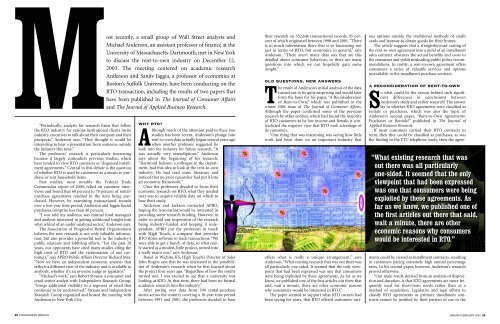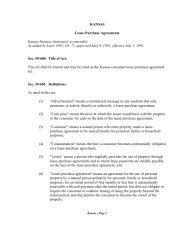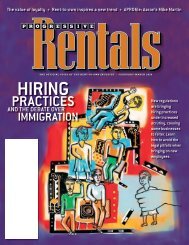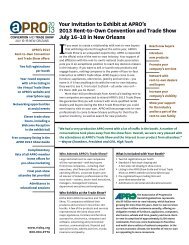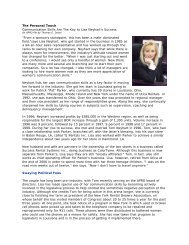Progressive Rentals - APRO
Progressive Rentals - APRO
Progressive Rentals - APRO
Create successful ePaper yourself
Turn your PDF publications into a flip-book with our unique Google optimized e-Paper software.
M<br />
“Periodically, analysts for research firms that follow<br />
the RTO industry for various institutional clients invite<br />
industry executives to talk about their company and their<br />
prospects,” Anderson says. “They thought it would be<br />
interesting to hear a presentation from someone outside<br />
the industry this time.”<br />
The professors’ research is particularly interesting<br />
because it largely contradicts previous studies, which<br />
have tended to view RTO contracts as “disguised installment<br />
agreements.” Central to this debate is the question<br />
of whether RTO is used by customers as a means to purchase<br />
or rent household items.<br />
Past studies, most notably the Federal Trade<br />
Commission report of 2000, relied on customer interviews<br />
and found that 60 percent to 70 percent of rentalpurchase<br />
agreements resulted in the item being purchased.<br />
However, by examining transactional records<br />
over a two-year time period, Anderson and Jaggia found<br />
purchases comprise less than 40 percent.<br />
“I was told my audience was mutual fund managers<br />
and analysts interested in getting additional insight into<br />
what is kind of an under-analyzed sector,” Anderson says.<br />
The Association of <strong>Progressive</strong> Rental Organizations<br />
believes the new research is not only valuable information,<br />
but also provides a powerful tool in the industry’s<br />
public relations and lobbying efforts. “For the past 20<br />
years, our opponents have cited many studies citing the<br />
high costs of RTO and the victimization of our customers,”<br />
says <strong>APRO</strong> Public Affairs Director Richard May.<br />
“Now we have an independent economic analysis that<br />
reflects a different view of the industry and is available to<br />
anybody, whether it’s an investor, judge or legislator.”<br />
“Michael’s work,” says Robert Strauss, a consumer and<br />
retail senior analyst with Independent Research Group,<br />
“brings additional visibility to a segment of retail that<br />
continues to be underserved.” Strauss and Independent<br />
Research Group organized and hosted the meeting with<br />
Anderson in New York City.<br />
ost recently, a small group of Wall Street analysts and<br />
Michael Anderson, an assistant professor of finance at the<br />
University of Massachusetts-Dartmouth, met in New York<br />
to discuss the rent-to-own industry on December 12,<br />
2003. The meeting centered on academic research<br />
Anderson and Sanjiv Jaggia, a professor of economics at<br />
Boston’s Suffolk University, have been conducting on the<br />
RTO transaction, including the results of two papers that<br />
have been published in The Journal of Consumer Affairs<br />
and The Journal of Applied Business Research.<br />
WHY RTO?<br />
Although much of the attention paid to these two<br />
studies has been recent, Anderson’s plunge into<br />
rent-to-own data actually began several years ago<br />
when another professor suggested he<br />
look into the industry for future research. “It<br />
was actually very serendipitous,” Anderson<br />
says about the beginning of his research.<br />
“Raymond Jackson, a colleague in the department,<br />
had this idea to look at the rent-to-own<br />
industry. He had read some literature and<br />
noticed that no prior researcher had put it into<br />
an economic framework.”<br />
Once the professors decided to focus their<br />
economic research on RTO, what they needed<br />
next was to acquire reliable data on which to<br />
base their study.<br />
Anderson and Jackson contacted <strong>APRO</strong>,<br />
hoping the Association would be interested in<br />
providing some research funding. However, in<br />
order to avoid any impression of the research<br />
being industry-funded and keeping it independent,<br />
<strong>APRO</strong> put the professors in touch<br />
with High Touch, a company that provides<br />
RTO stores software to track transactions. “We<br />
were able to get a bunch of data, so what really<br />
started as a modest, little project, turned into<br />
a really major one,” says Anderson.<br />
Based in Wichita, KS, High Touch’s Director of Sales<br />
John Rogers says that he was interested in the possibilities<br />
of Anderson’s research when he first learned about<br />
the project four years ago. “Regardless of how the results<br />
turned out, I was excited to see that a university was<br />
looking at RTO. At that time, there had been no formal<br />
academic research into the industry.”<br />
After poring over data from 100 rental-purchase<br />
stores across the country covering a 10-year time period<br />
between 1991 and 2001, the professors decided to base<br />
their research on 352,646 transactional records, 95 percent<br />
of which originated between 1998 and 2001. “There<br />
is so much information there that is so fascinating not<br />
just in terms of RTO, but economics in general,” says<br />
Anderson. “There aren’t many data sets that are this<br />
detailed about consumer behaviors, so there are many<br />
questions into which we can hopefully gain some<br />
insight.”<br />
OLD QUESTIONS, NEW ANSWERS<br />
The result of Anderson’s initial analysis of the data<br />
turned out to be quite surprising and would later<br />
form the basis for his paper, “A Reconsideration<br />
of Rent-to-Own,” which was published in the<br />
winter 2001 issue of The Journal of Consumer Affairs.<br />
Although the paper confirmed some of the previous<br />
research by other entities, which had found the majority<br />
of RTO customers to be low income and female, it contradicted<br />
the negative view that RTO took advantage of<br />
its customers.<br />
“One thing that was interesting was seeing how little<br />
work had been done on an important industry that<br />
offers what is really a unique arrangement,” says<br />
Anderson.“What existing research that was out there was<br />
all particularly one-sided. It seemed that the only viewpoint<br />
that had been expressed was one that consumers<br />
were being exploited by these agreements. As far as we<br />
know, we published one of the first articles out there that<br />
said, wait a minute, there are other economic reasons<br />
why consumers would be interested in RTO.”<br />
The paper seemed to support what RTO owners had<br />
been saying for years, that RTO offered customers various<br />
options outside the traditional methods of credit<br />
cards and layaway to obtain goods for their homes.<br />
The article suggests that a straightforward casting of<br />
the rent-to-own agreement into a mold of an installment<br />
sales contract obscures the actual benefits and costs to<br />
the consumer and yields misleading public policy recommendations.<br />
In reality, a rent-to-own agreement offers<br />
consumers a series of valuable services and options<br />
unavailable in the installment purchase contract.<br />
“What existing research that was<br />
out there was all particularly<br />
one-sided. It seemed that the only<br />
viewpoint that had been expressed<br />
was one that consumers were being<br />
exploited by these agreements. As<br />
far as we know, we published one of<br />
the first articles out there that said,<br />
wait a minute, there are other<br />
economic reasons why consumers<br />
would be interested in RTO.”<br />
A RECONSIDERATION OF RENT-TO-OWN<br />
So what could be the reason behind such significant<br />
differences in conclusions between<br />
Anderson’s study and earlier research? The answer<br />
lay in whether RTO agreements were classified as<br />
rentals or purchases, which was also the topic of<br />
Anderson’s second paper, “Rent-to-Own Agreements:<br />
Purchases or <strong>Rentals</strong>?” published in The Journal of<br />
Applied Business Research.<br />
If most customers carried their RTO contracts to<br />
term, then they could be classified as purchases, as was<br />
the finding in the FTC telephone study, then the agreements<br />
could be viewed as installment contracts, resulting<br />
in customers paying extremely high annual percentage<br />
rates. In his second paper, however, Anderson’s research<br />
proved otherwise.<br />
“Our main result, derived from an analysis of disposition<br />
and duration, is that RTO agreements are more frequently<br />
used for short-term needs rather than as a<br />
method of acquisition. Legislative and legal efforts to<br />
classify RTO agreements as primary installment contracts<br />
cannot be justified by their pattern of use in the<br />
28 PROGRESSIVE RENTALS JANUARY-FEBRUARY 2004 29


